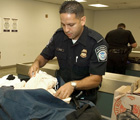Agricultural Information for International Travelers |
|
Whether you're a U.S. resident returning from abroad or a foreign visitor traveling to the United States, USDA wishes you a safe and enjoyable trip.
Before you depart, you should be aware of USDA's guidelines for bringing agricultural items into the United States. USDA restricts or prohibits many of these items from entering the country because they could carry pests or diseases that could threaten human health or devastate the environment, crops, agricultural animals, ornamental plants, and community landscapes.
Click on the links to the right to learn the general restrictions and requirements for: generally allowed food items, fresh fruits and vegetables, animal products and by-products, plants and plant parts for planting, cut flowers, firewood, and miscellaneous agricultural products.

Officers or agricultural specialists with the U.S. Department of Homeland Security's Customs and Border Protection (CBP) will inspect your baggage when you first arrive in the United States to ensure that the agricultural items you are carrying are allowable under USDA regulations.
Note: Individuals who fail to declare non-commercial agricultural items may be subject to penalties ranging from $1,100 to $60,000 per violation. These penalties are based on authorities granted to USDA through the Plant Protection Act and the Animal Health Protection Act.
While these general guidelines are useful, be aware that they do not cover all of the possible restrictions that can apply to specific agricultural items. The admissibility of a given item can change very quickly because disease and pest outbreaks can occur anywhere in the world at any time. That's why it is critical that you declare all agricultural products stored in your baggage, in mail and express carrier packages, and in passenger vehicles.
Additionally, we encourage you to visit the Web sites of the U.S. Department of Interior’s Fish and Wildlife Service (www.fws.gov) and the U.S. Department of Health and Human Services’ Centers for Disease Control and Prevention (www.cdc.gov) and Food and Drug Administration (www.fda.gov) because these Federal agencies may also have regulatory authority over certain items arriving in passenger baggage.
When traveling, remember to leave behind products that could contain insects and diseases. Don't pack a pest.
Last Modified: November 1, 2012
TRAVELER ALERT |
USDA prohibits rice, soybeans, Cicer species (e.g., chickpeas), and safflower seeds from 26 countries, including India, Pakistan, Saudi Arabia, and the United Arab Emirates. |